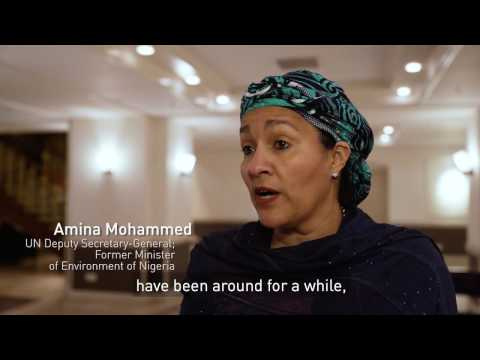UN Deputy Secretary-General on Boko Haram, Lake Chad Violence and Climate Change
Amina Mohammed is UN Deputy Secretary-General and former Minister of the Environment of the Federal Republic of Nigeria. In this interview, Mohammed points out how the nexus between security and climate change has become very apparent throughout Nigeria.
Watch more videos on environment, conflict, cooperation, and climate diplomacy on our video platform.
"Well for us it has come all at once, almost all at once. I mean the climate issues have been around for a while, from desertification to the floods, to the rising sea levels in the South of the country. But of recent, I think from the environment’s perspective, we can see that the nexus between security and climate change is even more apparent.
Those risks in the North East where we see the terrorism of Boko Haram have really been exacerbated by the drying-up of the Lake Chad. Much more desertification than expected. But what it has done: it has taken away livelihoods, it has exacerbated poverty, it brought the tensions where people have no hope, have no livelihoods. Trade has stopped. So that really, for us, is very real.
It is still a challenge as we try to overcome the conflict in that area: how do we recover? What are the partnerships that are needed? How do you replenish or recharge the Lake Chad? These are considerable investments that a country that does not have the resources it used to have now will have to contend with.
Then we move slowly to the middle of the country and we see that with desertification and the floods the land issue and the tensions between farmers and between herdsmen, have been exacerbated again, because the floods were not like this in the past and neither did we have so many of the challenges of desertification where farms have been taken away, urbanization has meant that we had to feed many more people with our population. So that is another challenge. And then as we come down to the South, the whole rising sea levels and the militancy in the Niger Delta is another conflict situation for us, so apparent every day.
What are we doing about it? We see this as an opportunity to address root causes of making investments in government structures that give inclusion to everyone to look at our economy by investing in infrastructure so that we can actually create the jobs and the enabling environment. And last but not least, really bringing climate change as an integral part of our planning so that we are not seeing it as something that is added on as an appendage or an afterthought."
This interview was conducted at the Planetary Security Conference in The Hague, 5-6 December 2016.









